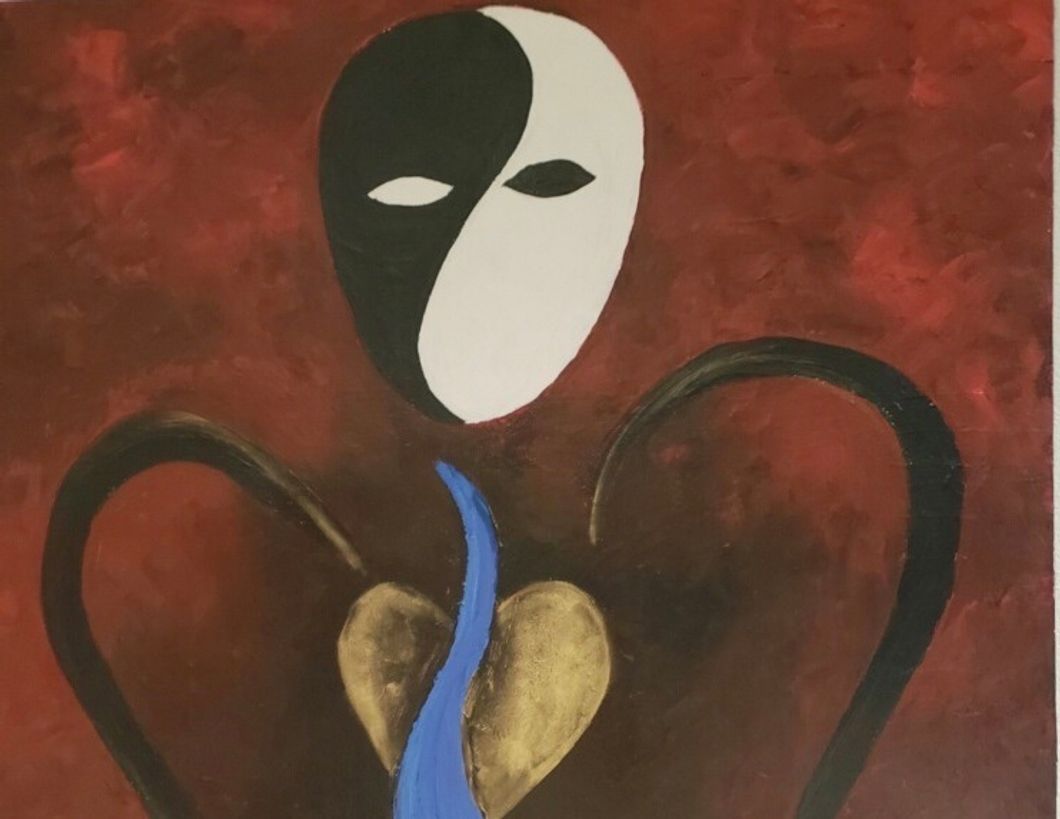Last week I had time to sit down with Professor Paul Minifee, a Rhetoric and Writing studies professor here at San Diego State University. A man of many passions, Professor Minifee tells me how his love affair with writing started at a young age. He brings to light the science of "therapeutic writing," and reveals that it's exactly what I'm doing at this very moment.
Back in the eighth grade, Professor Minifee began to journal not only what happened on a daily basis but also the extremely vulnerable, in-depth feelings that troubled him. Upon realizing that his emotions were a bit out of his own understanding, he decided to pick up some psychology books. Two in particular—Freud's The Interpretation of Dreams and another general Psychology book—began to help him connect the dots. This is where his soul-searching journey took root, through the powerful, timeless, introspective means of journaling.
The cover of his eighth-grade journal serves a place in this conversation as well. Pictured above, a roughly drawn ink self-portrait cloaks the page, symbolizing an identity crisis perpetuated by this young man's racial and class-related struggles. Painted in black ink contrasting the solid page, Professor Minifee told me about his belief in balance through yin and yang. A blue river runs from the brain and over the heart, symbolizing reason dividing the heart from the mind, as well as the way reason has a tendency to allay the heart.
I began to question why Professor Minifee felt so much more empowered behind the hermetic pages of his journal, given that he seems such a sociable, open man. He told me that he identifies as "a passionate introvert," with some deep brooding eagerness that isn't always visible on the surface. Which propelled us to the question, how did journaling lead to a position in teaching rhetoric?
Professor Minifee recalls an inspiring conversation he had with an old professor who referred to rhetoric as "the marriage between English and Psychology." Even more interesting, we began to discuss that when you write about your deepest traumas, you begin to accelerate the healing process. When a problem takes control over your life, you feel as lost, helpless, unsure of where the problem begins or ends. But, when you take the initiative to write about the problem, the trauma is now subject to you, rather than the other way around. Writing compartmentalizes your feelings and places you in control of your feelings in a gradual, healing way. This process, little by little, brings about a calming sense of peace, as bright to light by American Psychological Associations clinical research led by James Pennebaker.
Inspired by this idea, I asked Professor Minifee if he had one book he carried around with him. Without missing a beat he answered the Bible and Letters to a Young Poet by Rainer Maria Rilke. He quotes the following passage with such conviction that I felt as if humanity had discovered a new answer to the timeless question of how to cultivate and stimulate peace.
"There is only one way: Go into yourself. Search for the cause, find the impetus that bids you write. Put it to this test: Does it stretch out its roots in the deepest place of your heart? Can you avow that you would die if you were forbidden to write? Above all, in the most silent hour of your night, ask yourself this: Must I write? Dig deep into yourself for a true answer. And if it should ring its assent, if you can confidently meet this serious question with a simple, "I must," then build your life upon it. It has become your necessity. Your life, in even the most mundane and least significant hour, must become a sign, a testimony to this urge."
Professor Minifee helped me realize that everyone should have the right to write, but being a writer is so much more than keeping a journal. When writing down your thoughts becomes the most natural instinct you have to deal with a problem or feeling, this is when you know. Writing heals. Writing. Heals. In the purest sense, not everyone is meant to be a writer, but everyone should write. Whether it is about a movie you recently watched or a conversation with your father at the dinner table, writing is therapeutic. After all, we are all fumbling around in the endless darkness of uncertainty looking to fill the room with light. And while writing may not be the passion that lights an eternal flame, it will undoubtedly bring you closer to locating the switch.




















